- Home
- David Levithan
The Full Spectrum Page 18
The Full Spectrum Read online
Page 18
My feeling is that were I to ask for a place to stay, it would be disingenuous of me to not tell why I was without a home in the first place. Since I am neither willing to lie to my friends nor to sabotage my own chances of acceptance from them, my dilemma exists, for the time being, unresolved.
Aaron, my old roommate, fared better after the liquidation of our apartment. But then, Aaron is not transsexual. He found some co-worker friends to rent him a room for ridiculously cheap, and though I was happy for him, I was upset at my perceived abandonment. There are friends I could stay with, but it took me four months to find my last place, and I have no desire to wear out my welcome.
We talk for a bit, Brooklynn and I, about the idea of chosen family, the theme echoing my Sunday-night conversations with Cate. Brooklynn is a rarity; having been disowned by her own family years ago for turning her back on an oppressive Mormon culture, she is one of the few who can truly empathize with the life of transition without having to live it.
My cell battery dying, we say goodbye with the tenderness of two friends who do not want to retreat from a good conversation before its natural end. I tell her, as I told Cate and Jess, that I will call her soon. The absurdity that I am homeless yet own a cell phone is one I try not to acknowledge.
Almost five, I drive to Lynn's office to meet Myke and move office furniture. I arrive to find Lynn sobbing and the rest of the helpful therapy-staff-turned-moving-crew embroiled in overcoming some logistical or bureaucratic obstacle I am not able to fully untangle.
Eventually we load a few office tables, large and round like the ones you find in a school cafeteria, onto a pickup truck and then to some garage. I am considerably weaker than I used to be, thanks to hormones and poverty, and the work, though relatively simple, is difficult.
Our moving tasks apparently done, Myke and I return to his house to grill some Boca Burgers. Lynn calls from her office, still upset, and I am saved from the temptation of bending my own ethical rule about asking for a place to crash when Myke tells me that tonight might not be the best night to hang. I finish my burgeresque dinner and leave, more relieved than disappointed, and grateful for the meal.
It is early still, though. The few hours before midnight that can legitimately pass as night before becoming late are often the longest for me, and leave me keenly aware of my own boredom.
The library will already be closed, I know, and my last two dollars and thirty-five cents went around one o'clock for a can of beans and a large bag of chips that I hoped would last until Sunday, when I was scheduled at least to return to work. I haven't yet begun to plot the feasibility of working while living out of my car, but am remaining cautiously confident in it as a reality, despite the fact that I am basing that belief, really, on nothing.
Still, I am in search of diversion yet again. Movies, bars, and even coffee shops would require a down payment of some sort, my good-faith purchase that would barter me the extended visit I was sure to wallow in. I settle for browsing at Borders. A bookstore is, essentially, as good as any library. I listen to new and interesting CDs, skim some old and not terribly interesting poetry, and take a look at some new fiction until the store closes.
Not yet tired of the day, and knowing that tonight will be harder to sleep through in the commuter lot than last, I go to a small suburban park, complete with gazebo and benches, to sit somewhere that isn't behind a steering wheel, and to think.
I feel suddenly like I am running in place. I try to remind myself that it's just a black mood, one of many that accompany transition and homelessness and desperation. Still, the feeling persists. I'm on a treadmill, and that cardboard panorama of life in the “Shiny Happy People” video is scrolling past me over and over again. Will I ever manage to get back on my feet and begin moving forward again? Both at the same time, preferably. Even my writing feels lazy. Cramped. Without momentum.
Michael Stipe has completely abandoned me, and I am left alone here on the soundstage with that old guy on the bicycle to keep me company.
I think about gender outlaws, who say not to be pigeonholed by societal gender norms. Buck the system. Fight it. Deconstruct it. I think of the feminist who says to break free from the shackles of gendered oppression. I think about walking down the street with my friends, and I don't want to have to be a status warrior.
I'm busily telling the maitre d' “I'm not with them” in a hushed, embarrassed tone. I feel like a traitor, but it shouldn't be an effort to be normal. I don't want it to be. I don't want fanfare. Is it laziness not to care? Selfishness, perhaps?
I'm still in my head, in my memory of just a few short days ago. My friends are with me. We're having fun. I want this to be my life— this moment here, in this instant that's already passed. I won't worry about the dismantling of some great oppressive societal force. We'll live our lives, happy and free, oblivious to the system as it crumbles around us.
I sit there, the final bit of traffic grazing slowly by. I sit and write amidst a few small clusters of teenagers, some with tambourines or bongos or long gothy skirts, as they try to delay the end of summer. I sit and write, waiting for the night to be over.
It occurs to me that transit now has more than one meaning.
Perhaps in time it will become the all-encompassing definition it was intended to be. A girl in transit. A life in transit. When are we not in motion? Up or down, left to right, fast, slow, backward and forward, we move.
We can be neither created nor destroyed, or maybe those are the only two things we can ever be. It is constant, and we call it change.
Walking the Tracks
by Eric Knudsen
I never told him, but when I got dressed in the morning before school, I always tried to look like him. Well, maybe I didn't want to look exactly like him, but even if I could, I still couldn't buy the confidence in his walk or his free-spirited smile. When he went out at night or was off working on the weekends, sometimes I would go in his room and look around at his stuff. I wasn't sneakily probing into his personal life to uncover any dirty secrets; I just wanted to feel closer to him. Sure, he tormented me just like siblings often do, but he also assumed the job of my protector. Even at a young age my brother had patience with me.
If I didn't tell people that we were related, they would never have guessed Bryan and me were brothers. Our personalities and lifestyles were complete opposites. With red hair, blue eyes, and a football-player build on a tall frame, Bryan didn't look anything like me. So when he approached my family and told us that he was going to join the United States Marine Corps, I was feeling contradictory emotions. I was shocked that he had such aspirations, but at the same time it didn't surprise me that he would do something I never had thought about.
Whereas younger siblings often feel left out because they can't hang out with the “big kids,” more often than not Bryan would ask me to come fishing with him or join him on a bike ride to the baseball field. Although I tried, athletics never came naturally to me, but that didn't matter to Bryan. Even if he was going to do something I had no interest in, he would ask me to come along despite the expectation of me turning down his offer. I now realize that was his way of saying I love you. I try not to have regrets in life, but I wish I had taken him up on his offers more.
Young boys like to make fun of each other to build a sense of camaraderie, but even Bryan knew the limits. He was often the leader of the pack, but that didn't mean he ignored his sensitivity to define his masculinity. If someone teasing me went too far, Bryan would let them have it. If someone didn't accept me into the group, then Bryan thought twice about his being there.
Late in July, Bryan's last week home with the family, he asked to go for a walk with me. The sun had just set fire to the horizon and the low chorus of crickets started up in the tall grasses. There was a different, earnest sound in his voice, and although spending time with my brother was nothing new to me, he'd never asked me to walk with him before. Sometimes in life an unexplained premonition takes over your body and yo
u know there is only one choice to make. My uncertainty showed in the airiness of my voice as I obliged nonchalantly, as if I didn't sense the uneasiness in the room. It was a cool night, so I ran to get a light jacket and pushed at the screen door, hearing it slam behind me.
This night was unique for a number of reasons. Aside from being one of the marked times in my life when I was actually nervous around my brother, he was about to go off to boot camp, and the family anticipated his newfound responsibilities and duty would separate him from the life he once knew. Although our house would always be his home, becoming a man would exempt him from parental rule and render their commands as mere suggestions. I wondered if he would change as a person—I always heard the military could do that to some people. Bryan wasn't known for having the best structure in his life, nor was he known as being the most responsible person at times, so maybe these new demands would change him drastically.
We came upon a set of train tracks, one that still brings back fond memories from my childhood. I can still hear the sounds from my window of the old steam train that appeals to the tourists. I began balancing on the rails with my hands outstretched at either side of my body like an eagle in flight. Bryan and I used to place pennies there on the tracks, and whatever other objects we were curious to see flattened under the weight of a steam engine.
We talked about the summer and we talked about school, and we talked about the new part of his life he was about to embark on. I knew he had something to tell me but I didn't know what exactly, and I watched his words carefully for the anticipated moment.
“I want you to take care of the family. It's not going to be easy for Mom, but I want you to be there for her. Try not to fight with your sister. I know it's tough, but try to be nice to her.” It was one of those moments when you are supposed to keep quiet and just listen, and aside from nodding occasionally, that's exactly what I did.
There was a slight pause before his voice changed tone. “But I want to make sure that everything is going to be all right with you.” He turned to meet my eyes with the most compassionate and pensive look on his face. “I know, Eric.” My heart started beating faster and my legs forgot how to work correctly. All at once I felt naked, revealed, like someone just ripped a blanket off my sleeping body. I wanted to run, I wanted to say “No, you don't know,” but that was before he added, “And I want you to know that I don't care. I love you and I'm here for you.” My vision got cloudy and the corners of my mouth began to twitch. I moved away from my brother's face as he put his arm around my shoulder and pulled me closer. I turned toward him and fell into an embrace while tears slowly soaked into his shoulder. It was a moment when I cast away all embarrassment and shame, because my brother, the man who I looked up to for so many years, was telling me he loved me just the way I was.
The rest of the night went by so quickly. I shared memories and feelings that I never thought I would reveal to my brother, but it felt so right knowing he held on to my every word. My brother and I always had a sense of humor between us, and being able to laugh about being gay and making light of the situation allowed him to understand me in a new way while giving me a newfound sense of confidence. It's amazing what good can come of such seemingly bad circumstances. My brother joined the military and is serving for his second time in a war, yet because of the initial impending situation we grew closer than ever before.
They say that siblings are a link to the past, and I truly believe this. By sharing an important part of my identity with someone I have known so long, it was as though we relived our youth in that one night without having to use words. Through the simple fact of knowing the last piece of the puzzle, everything finally made sense. In the place of a past of secrecy and misunderstanding I was finally known.
Although I don't have the same desire to join the armed forces, Bryan inspires me to reach for what I want in life even though it may be dangerous and I may face adversity in my journey. He has taught me what it means to devote myself to other people, an entire nation, and I highly honor his selflessness. I never feel in comparison with my brother, nor do I feel in competition with him. My mother feels blessed that she has such dynamic children: one son is the all-American boy, taking part in Boy Scouts and the football team before joining the Marines, while the other son excels in the arts and academics while possessing an identity that is often subject to ridicule and misunderstanding by society.
All kids have a role model in their life, whether it is a comicbook character with superpowers, a famous actor, or a prominent political figure. I always had Bryan. I will never know definitively what it takes to become a man, but I guess it's one of those things you just become, and in retrospect you know yourself in a new light with enough experience and knowledge. When I find out I'll be sure to send a postcard. But until then, I won't have to walk the tracks alone.
The Most Important Letter of Our Life
by JoSelle Vanderhooft
Junior Year of High School
Salt Lake City, Utah 1996
Dear Joey:
I hope you'll forgive me if I sound a little awkward here. I mean, what do you say to your past self now that the past is gone? “Hi. Hello. It's me—I mean, it's you—seven years from now. At 23. See, it's late where I live, and I'm lonely, so I just thought I'd write and tell you—”
Tell me what? you'd probably ask, because you were so suspicious and scared back then. Getting a B+ on a test meant that you'd never make it into college, and having a guy wink at you meant, of course, he was going to drag you into the nearest deserted classroom and rape you. But this time, Joey, no one could laugh at your paranoia. You're right to be suspicious of me, of this stranger from the future with your hair and your eyes and your voice, only not really. Because they say your cells grow and die and replace themselves, so you basically have a new body every five years or so. As for my eyes, they've seen things I couldn't even imagine at your age: New York City as an honest-to-God New Yorker, the streets of London up close and personal. September 11, 2001. And as for my hair … see, that's just the thing. Last night, someone touched it for the first time. And I don't mean touched it in the sense that Steve touches it when he's asking, “Want me to just cut off the split ends today?” or how Mom touches it when it's three a.m. and you're standing over the toilet bowl puking your guts out with the stomach flu. I mean touched it like that, touched it like it mattered, and for the first time in your life you felt like you were home.
Joey, I know this is strange but you've got to take this letter very seriously. I'm writing to tell you about something important. You don't know it now, but you've got entire rivers of fire in your veins. And in your center, where you should have a heart, there's an inferno that's slowly climbing the walls and eating you piece by piece. It's almost sad that it's you and not your house that's on fire. With your house, you could recognize what was happening. You could grab a fire extinguisher and hold off the flames while frantically dialing 911. But when it's your eyes, hair, and cells and not the carpet, lamps, and sofas, it's so easy to shut the door and say, “I'm not here and this isn't really happening.” Especially when every fiber of your being is, well, just sitting there fiddling.
You always knew you were different, you just didn't know how or why. Maybe because you were adamant about dresses and long hair when everyone else wore pants and bob cuts. Maybe because at seven years old you were five feet tall and an A cup while the rest of the girls weren't ready to start titty training. Or maybe it was because you never believed boys had cooties, and actually preferred playing with them … when they weren't trying to cop a feel, of course. Which wasn't all that often, this being Utah in the 1980s (we'll talk about your men issues later). You didn't know for sure. You only knew that dances and dating were an insult to your intelligence, and kept you from getting to know Oscar Wilde and William Shakespeare better. Now you'd rather be studying for Academic Decathlon while your girlfriends ogle the shirtless men's soccer team practicing on the field outside Ms. Barton's windo
w. Oh, and sometimes, even though you're happy with your boyfriend, you secretly dream about having a threesome with the cute-but-geeky girl who sat next to you in AP Art History.
Thing is, Joey, you're queer. You're a lesbian, or at the very least bisexual. Truth be told, I'm still waiting for that letter from the forty-year-old me to sort it out for sure. But you're not straight and you've known it since you were four or five years old, when you went through the mall sticking your tongue out at the men and smiling at all the pretty ladies. You're gay and you are not being honest with yourself.
I'm sorry. I'm not trying to judge. I remember being you and I remember what you were up against. You grew up down the street from a Wal-Mart and about seventeen Mormon ward houses in a suburb of Salt Lake City that still hasn't figured out what the 1970s meant. Oh, it definitely wasn't the Bible Belt, but then again they don't call it the Zion Curtain for nothing. Gay just … wasn't talked about, unless we're talking about playground taunts (“Oh my God, Jo-Selle!! That book bag is sooo gay!” “…. no it's not, it's pink!”). You had to visit your dad and stepmom in Massachusetts to hear the word used correctly, and even then you thought it must mean something dirty.
“And then they put a sign on Mr. Gonzales' back that said ‘I'm gay!’ and he walked around the class with it on all day and didn't notice!” said Benny, your eldest stepbrother's best friend, on the way to the annual folk festival in Lowell. The entire carload of kids laughed, including you. You weren't sure why you were laughing, except that whenever anyone back home said “gay,” they always laughed. So it must be really funny. But after your stepmom gave you all a ten-minute lecture on what the word actually meant, and why jokes like that were wrong, you knew you'd never laugh at another one. And you also knew something else: no matter what you and your stepmom believed, the world at large still thought gay people were pretty damned hilarious. At least, funny enough to deserve public humiliation. And after having your schoolmates poke and prod at your burgeoning breasts for two years, you decided you'd had enough humiliating to last a lifetime.

 The Lover's Dictionary
The Lover's Dictionary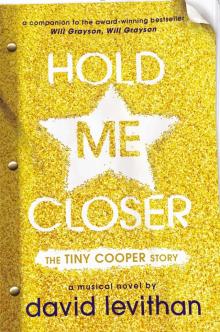 Hold Me Closer: The Tiny Cooper Story
Hold Me Closer: The Tiny Cooper Story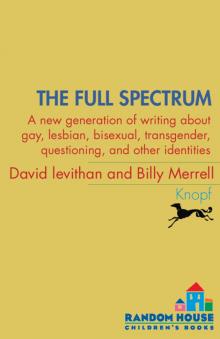 The Full Spectrum
The Full Spectrum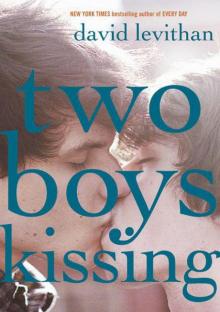 Two Boys Kissing
Two Boys Kissing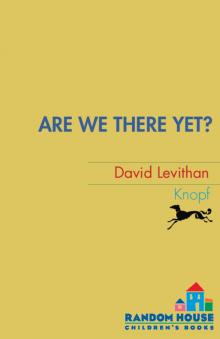 Are We There Yet?
Are We There Yet?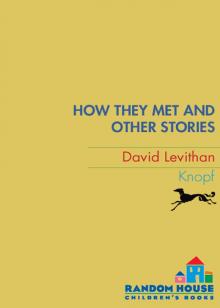 How They Met and Other Stories
How They Met and Other Stories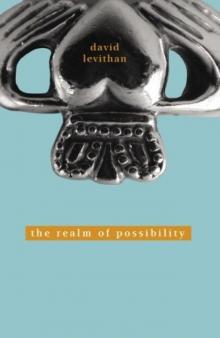 The Realm of Possibility
The Realm of Possibility Love Is the Higher Law
Love Is the Higher Law 19 Love Songs
19 Love Songs Another Day
Another Day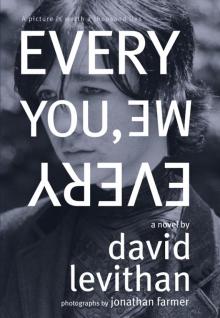 Every You, Every Me
Every You, Every Me Boy Meets Boy
Boy Meets Boy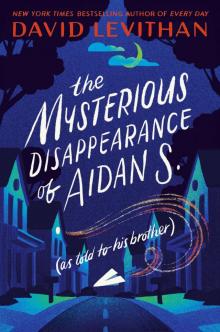 The Mysterious Disappearance of Aidan S. (as told to his brother)
The Mysterious Disappearance of Aidan S. (as told to his brother) 21 Proms
21 Proms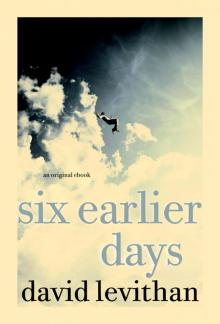 Six Earlier Days
Six Earlier Days Wide Awake
Wide Awake Take Me With You When You Go
Take Me With You When You Go Someday
Someday You Know Me Well
You Know Me Well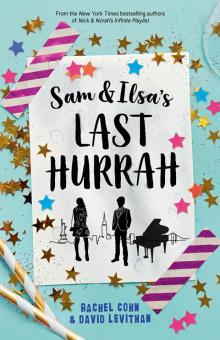 Sam and Ilsa's Last Hurrah
Sam and Ilsa's Last Hurrah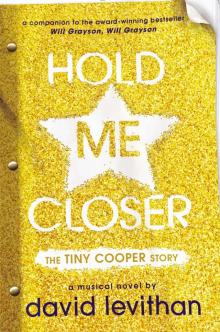 Hold Me Closer
Hold Me Closer Likely Story!
Likely Story!